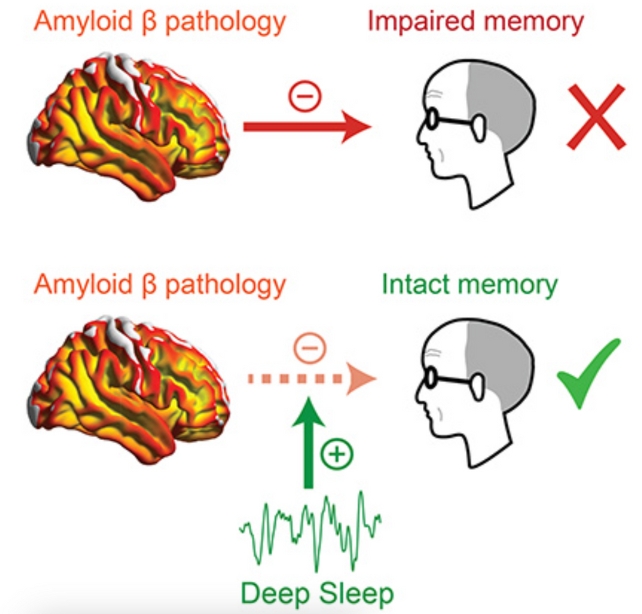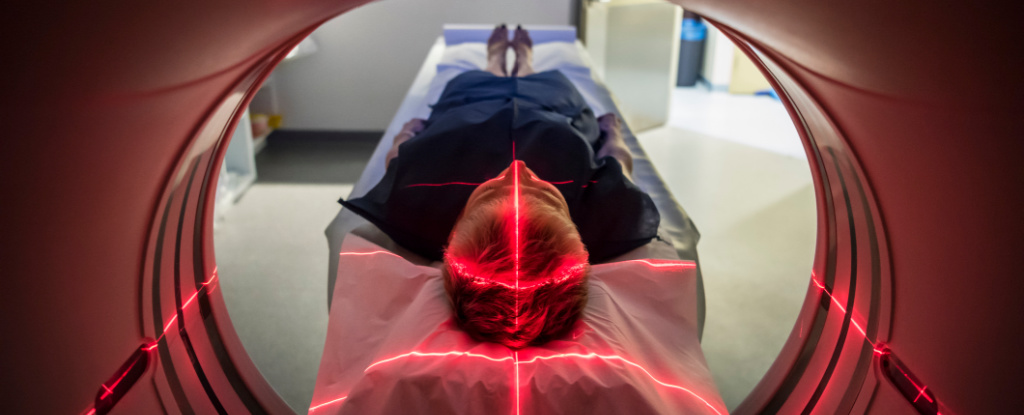Deep sleep could be key to forestalling slow declines in brain health that may one day lead to Alzheimer’s disease, the most common form of dementia.
In their 2023 study of 62 older, cognitively healthy adults, researchers from the University of California (UC) Berkeley, Stanford University, and UC Irvine in the US found individuals with brain changes associated with Alzheimer’s performed better on memory function tests as they got more deep sleep.
This was irrespective of education and physical activity, two factors along with social connection known to contribute to cognitive resilience in older age.
Those with similar Alzheimer’s-linked changes who failed to get as much deep sleep didn’t fare quite as well on the same tests. By comparison, sleep made little difference to those individuals with few deposits.
Taken together, the results, which were published in May last year, imply having a generous amount of solid shut-eye could help support the decline in memory that sets in as dementia begins to take hold.
“Think of deep sleep almost like a life raft that keeps memory afloat, rather than memory getting dragged down by the weight of Alzheimer’s disease pathology,” said University of California (UC) Berkeley neuroscientist Matthew Walker.
“This is especially exciting because we can do something about it. There are ways we can improve sleep, even in older adults.”
The study echoes previous research which has found a build-up of amyloid-beta proteins in the brains of people with disrupted sleep.
But poor sleep is both a risk factor for and a symptom of Alzheimer’s disease, making it tricky to tease apart cause and effect. Likewise, clumpy amyloid-beta proteins might only be a sign of Alzheimer’s disease, not its root cause.
Even so, levels of amyloid-beta proteins are commonly used as a marker of Alzheimer’s disease, as research suggests they – and another protein called tau – can start clogging up brain cells decades before symptoms of the disease arise.
Past research from Walker’s group found significant levels of amyloid-beta aggregating in the brains of older adults can disrupt deep sleep – also known as non-rapid eye movement slow wave sleep – and impair memory function.
But some folk appear to stave off the decline that comes with Alzheimer’s disease, even when levels of amyloid-beta proteins are relatively high. To find out why, Walker and colleagues monitored participants’ brain waves as they slept, and then asked them to complete a memory test the next day.
Among those whose brain scans revealed similarly high levels of beta-amyloid deposits, getting a good night’s sleep seemed to make a critical difference in cognitive function.
This effect was only seen when the researchers looked specifically at non-rapid eye movement slow wave sleep, and not at other sleep wave frequencies or sleep stages.

Longer-term studies in older adults are needed to test whether increasing deep sleep over a number of years can actually help preserve a person’s cognitive function in that time, even as levels of amyloid-beta increase.
This research adds to scores of studies suggesting that sleep could be a modifiable risk factor for Alzheimer’s disease, one that could potentially forestall molecular changes by giving the brain time to clean up waste products that accumulate during the day. It also points to sleep quality being important.
“With a certain level of brain pathology, you’re not destined for cognitive symptoms or memory issues,” UC Berkeley neuroscientist and lead author Zsófia Zavecz said of the study findings in 2023.
Although people may display molecular changes indicating a progression toward Alzheimer’s disease, Zavecz says their findings suggest lifestyle factors can help buffer against those effects. “One of those factors is sleep and, specifically, deep sleep,” she said.
The study, though small, also hints at why getting good sleep naturally might be a better option than taking sleeping pills to get some shut-eye.
Recent research shows users of sleeping pills appear to have lower levels of amyloid proteins in their cerebrospinal fluid, which washes the brain clean at night. But these medications come with side effects; they may also lull people into shallow bouts of sleep rather than deep sleep phases.
Instead, to set yourself up for a good night’s sleep, Zavecz suggests cutting out coffee late in the day, doing some exercise, avoiding screen time, and taking a hot shower before bed.
While you snooze, rest assured scientists are working hard to figure out the knotty problems of Alzheimer’s disease, which affects millions of people worldwide.
The study has been published in BMC Medicine.
A version of this article was first published in May 2023.





